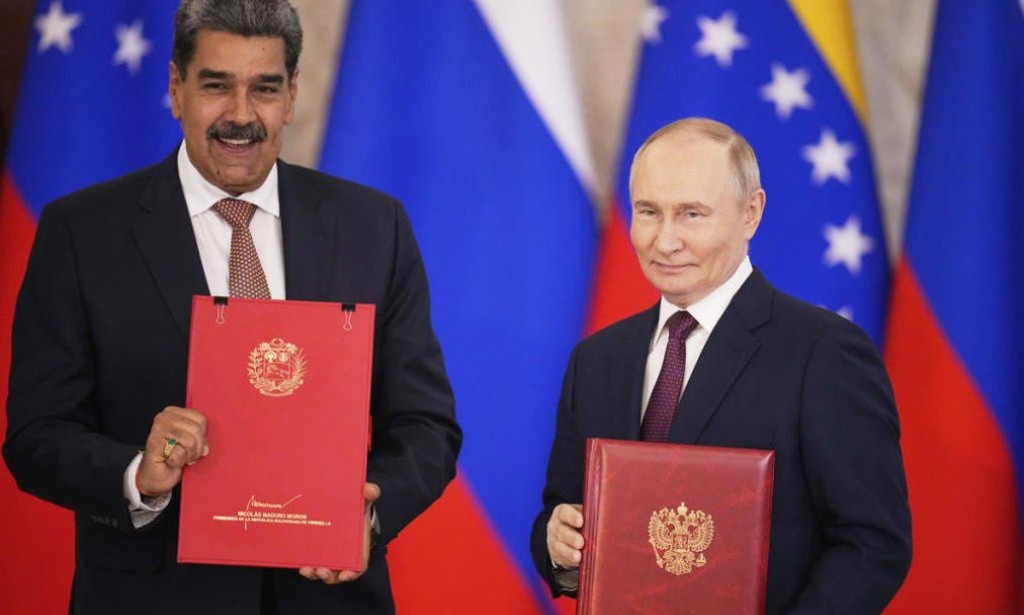Russia is “ready” to help Venezuela as the U.S. beefs up its military presence near the South American nation, Russia’s foreign minister said.
Caracas and Moscow signed a strategic partnership in May. The Kremlin is “ready to fully act within the framework of the obligations that were mutually stipulated in this agreement with our Venezuelan friends,” Sergey Lavrov said in comments reported by Russian state media on Tuesday.
Russia and Venezuela have long-standing diplomatic, economic and military ties stretching back to Venezuela’s former leader, Hugo Chávez. A factory to pump out Kalashnikov munitions opened in Venezuela in July and a Russian cargo aircraft, sanctioned by the U.S. and known for transporting defense equipment to Venezuela, landed in the country late last month, according to flight records.
Why It Matters
The U.S. military footprint close to Venezuela has ballooned as the White House forges ahead with a strike campaign it has framed as a lethal crackdown on drugs smuggled from Latin America, while international experts and former officials have described the attacks on suspected drug boats as illegal under international law.
The overwhelming show of force—augmented by the world’s largest aircraft carrier, the USS Gerald R. Ford, arriving in waters close to Venezuela along with three warships on Tuesday—has raised questions about whether U.S. President Donald Trump hopes to topple Venezuela’s authoritarian leader, Nicolás Maduro. Caracas has loudly protested the gathering of U.S military forces close to its coastline, at once appealing for peace and insisting Venezuela is ready to respond to any American attack.

What To Know
The agreement between Caracas and Moscow hasn’t yet come into force but is “getting close,” Lavrov said. The leaders of both countries have ratified the strategic partnership.
“Now it is at the final stage of ratification [by the Russian Legislature],” Lavrov said, Tass reported. “It states the need to continue our security cooperation, including military-technical cooperation.”
Venezuela has not requested military assistance or that Russian weapons be deployed in the country, Lavrov said. But a senior Russian official suggested this month that Russia could furnish Venezuela with its experimental Oreshnik intermediate-range ballistic missile, which Moscow debuted to the world in a strike on central Ukraine a year ago.
“We supply the country with virtually the entire range of weapons, from small arms to aircraft,” said Alexei Zhuravlev, who sits on the defense committee of Russia’s state Duma, the lower parliamentary house. Zhuravlev said the details of which weapons Russia sends to Venezuela was classified, but there were no “obstacles to supplying a friendly country with new developments” like Oreshnik, or Moscow’s Kalibr cruise missiles that it has extensively used against Ukrainian targets.
“The Americans could be in for some surprises,” Zhuravlev said.
The alliance between Caracas and Moscow is strong, and hands Russia a friend close to the U.S., said Carlos Solar, a senior research fellow in Latin American security with the U.K.-based Royal United Services Institute (RUSI) think tank. But Venezuela gets the better end of the deal, Solar told Newsweek.
Venezuela has long hosted Russian military advisers and purchased military supplies from Moscow, although its S-300 surface-to-air missile systems would struggle to intercept any kind of attack the U.S. could launch.
U.S. strikes on alleged drug boats in the southern Caribbean and eastern Pacific have killed at least 75 people since the start of September, according to the administration’s publicly acknowledged numbers. Strikes have continued in the weeks since the administration confirmed the USS Gerald R. Ford and the thousands of additional personnel in tow would head for the region.
Venezuelan Defense Minister Vladimir Padrino López ordered the mobilization of 200,000 soldiers across the country on Tuesday against the “threat” posed by the U.S.
The strikes appear to be cutting at U.S. relationships with key allies, including Colombia. The country’s president, Gustavo Petro, ordered Bogotá’s security and intelligence forces to stop communication sharing with the U.S. on Tuesday as long as Washington attacks boats in the Caribbean. CNN separately reported on Tuesday that the U.K. had paused intelligence sharing on suspected drug vessels more than a month ago.
What People Are Saying
Venezuelan Foreign Minister Yvan Gil Pinto said on Tuesday that Caracas was grateful for “Russia’s firm solidarity for the defense of our sovereignty.”
Maria Zakharova, a spokesperson for the Russian Foreign Ministry, said earlier this month that Moscow stood ready to "respond appropriately to the requests"from Caracas.
What Happens Next
It’s not clear how far the U.S. will go or whether the administration will carry out strikes on Venezuelan soil.



You must be logged in to post a comment.